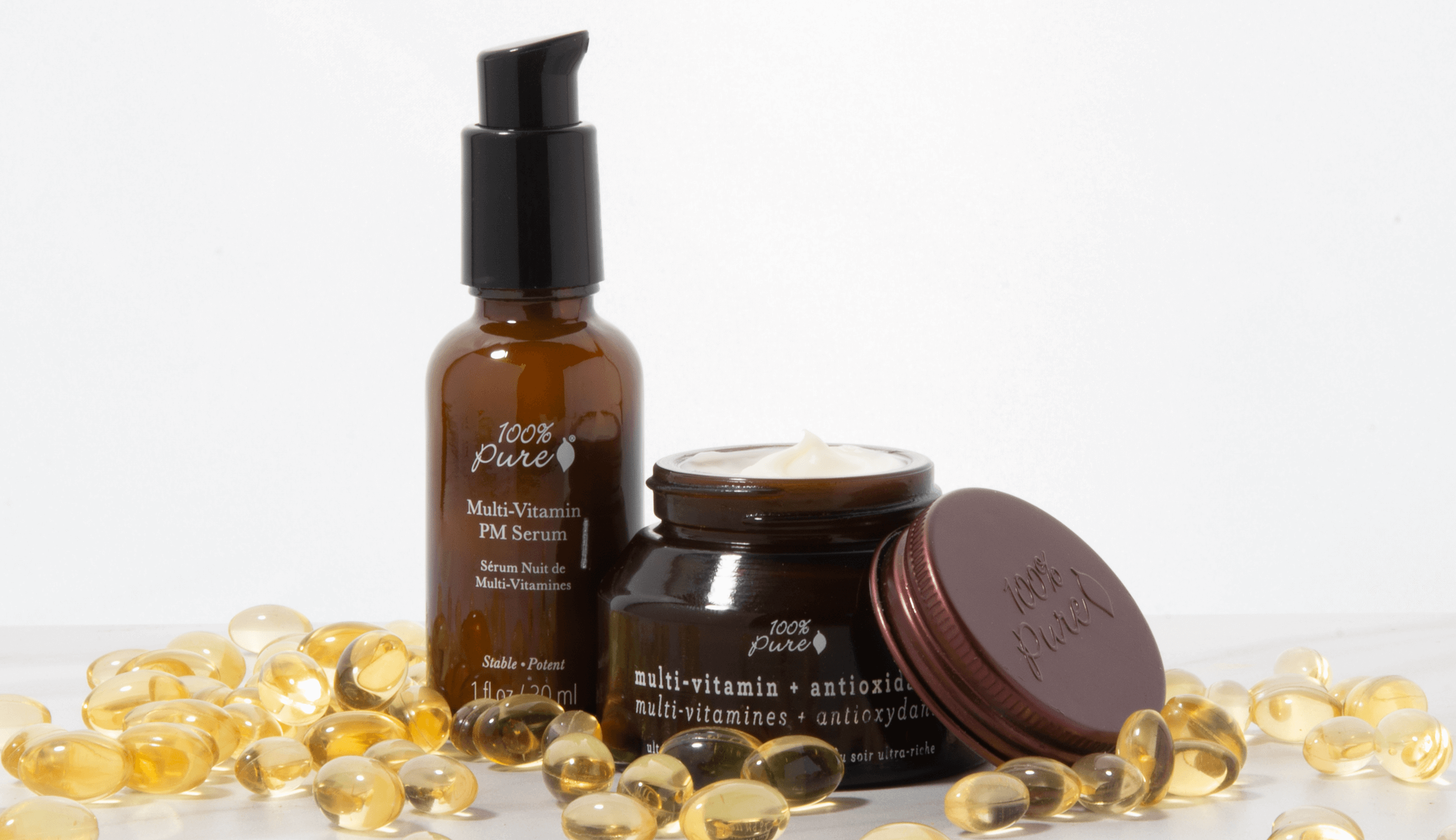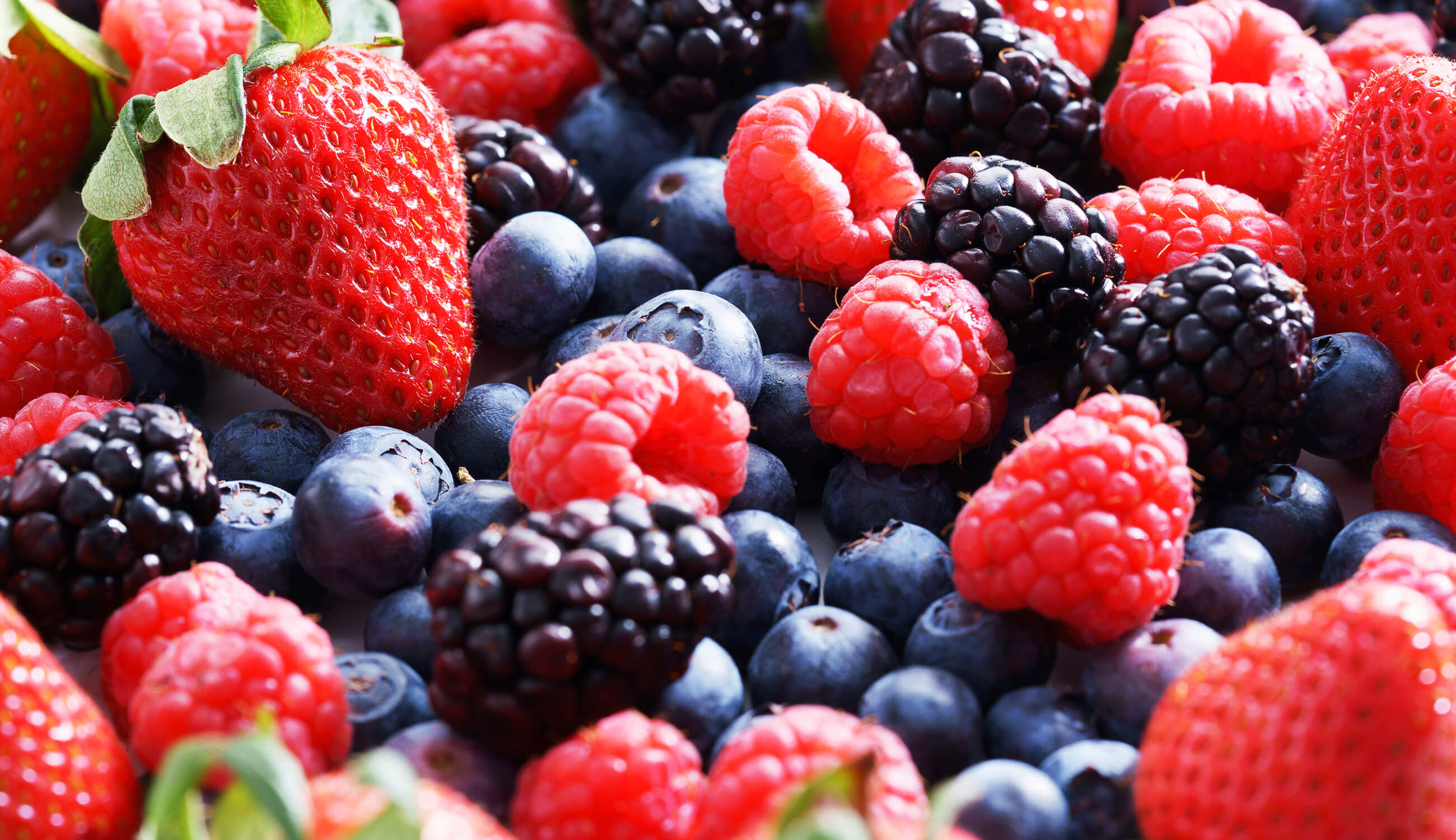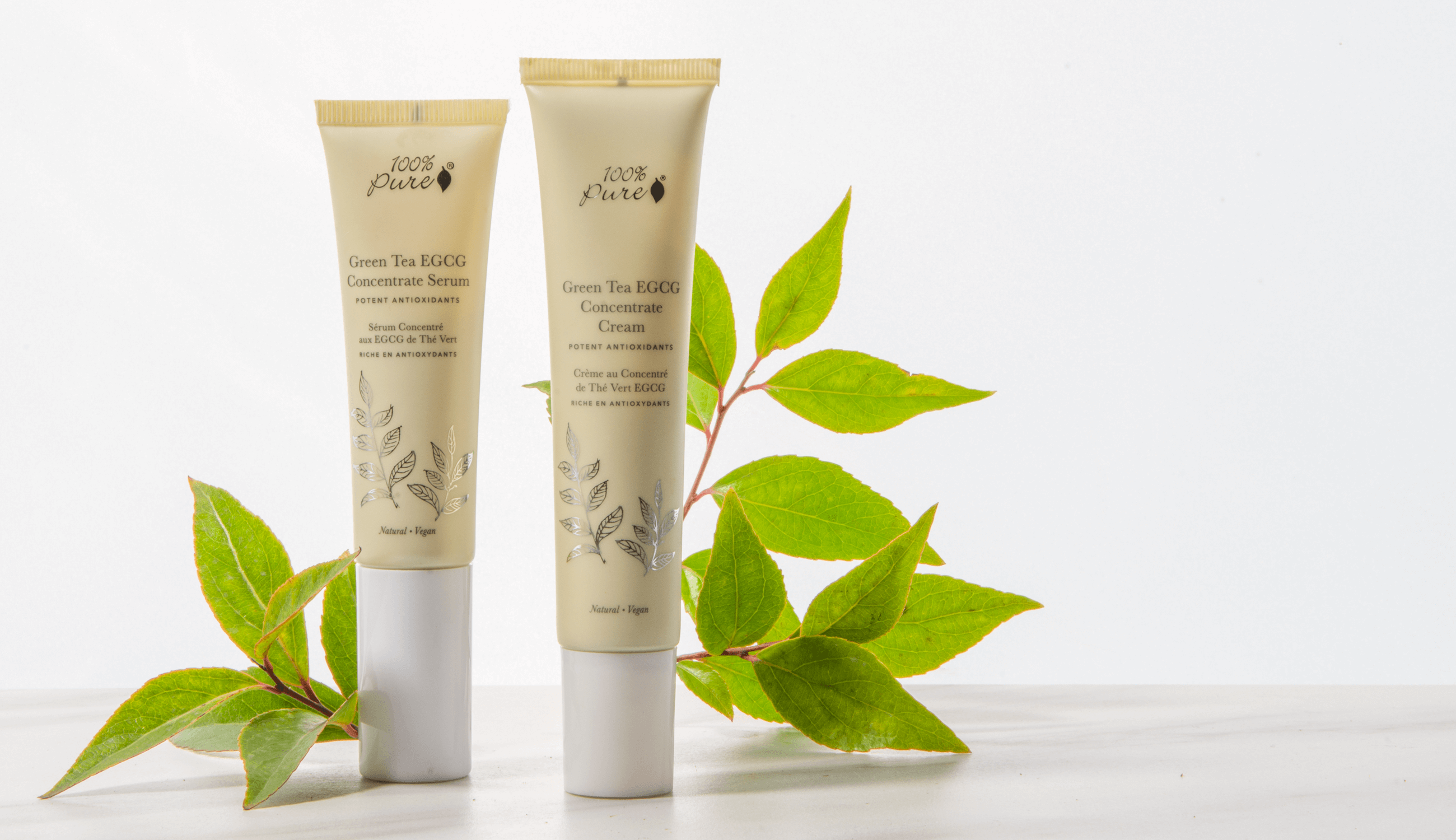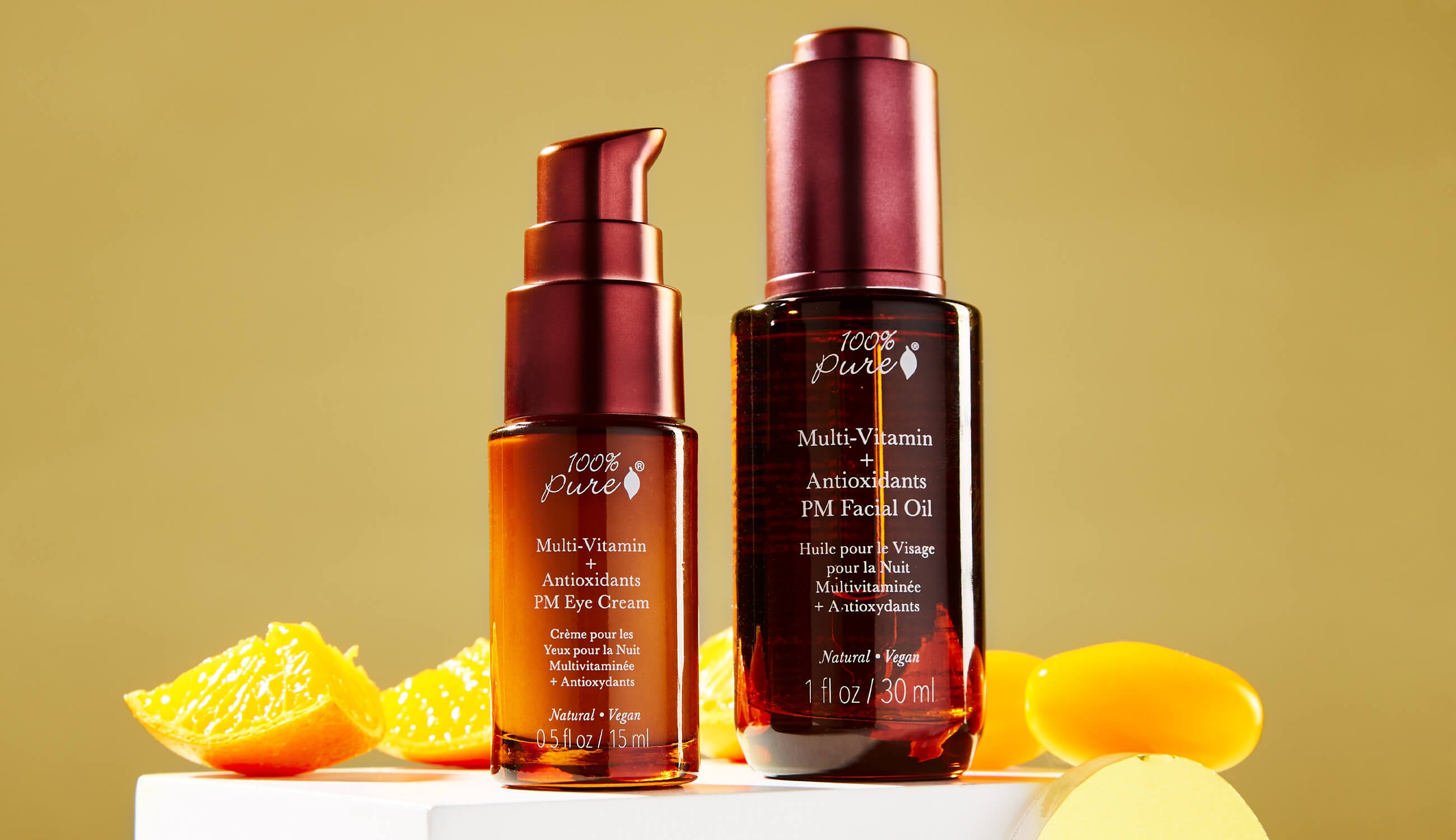The science behind these super skin beneficial ingredients, and where to find them
Posted on August 30, 2021 Written by: 100% PURE ®
So you’ve heard about antioxidants, and you’ve heard they’re good for you. But do you know what they are, what they can do, or why your skin needs them?
As the lead formulator for the first line of natural fruit pigmented® cosmetics, 100% PURE™ co-founder Susie Wang knows a thing or two about healthy skin. That’s why she intentionally packs our makeup, skin care, and body care full of antioxidants – and we’ll tell you exactly why you (and your skin) should care!
Merriam-Webster defines an antioxidant as:
A substance (such as beta-carotene, vitamin C, and alpha-tocopherol) that inhibits oxidation or reactions promoted by oxygen, peroxides, and free radicals.
Antioxidants serve to protect the living body from the destructive effects of harmful free radicals found in our everyday environment. Considering that antioxidants cannot be found naturally in the human body, you’ll need to supplement them with your diet, supplements, or through topical applications.

To better understand antioxidants, you’ll first need to understand what free radicals are, and how they work.
Free radicals are reactive atoms that contain one or more unpaired electrons, “especially: one that is produced in the body by natural biological processes or introduced from an outside source”. These ‘outside sources’ can include UV rays, toxins, pollution, environmental damage, and even tobacco smoke. Each is capable of damaging your body’s cells, proteins, and DNA by altering their chemical structure.
Free Radicals: Inside Vs. Out
So how do free radicals affect us, and what are antioxidants going to do about it? Your body is essentially a battlefield. Every second of every day, your cells are continuously bombarded with environmental pollutants, toxins, radiation, stress, germs, and so much more than our eyes can see.
What happens when a free radical enters the body? Some free radicals are created as a direct result of bodily functions, like exercise or metabolizing our food for energy.
On the flip side, free radicals can also come from external factors, like the ones we’ve listed above (pollution etc). Free radicals are simply by-products of chemical reactions in our cells. Free radicals aren’t necessarily bad in and of themselves, but they can cause permanent harm when they outnumber your body’s natural defenses.
Electrons On the Loose
In your body, most electrons come in pairs. Free radicals are very unstable molecules that contain unpaired electrons. They will stop at nothing to pair up, which means stealing electrons they need from other molecules. This causes oxidative stress and cellular damage; once one free radical is created, a chain reaction occurs and many more are created.
Oxidative stress is linked to all kinds of problems including and not limited to: DNA damage, cell death, premature aging, neurodegenerative diseases, cardiovascular disease, and cancer.
Just when things are really looking grim, here come antioxidants to the rescue! Antioxidants prevent and stop cellular damage caused by oxidants, so the body needs a healthy balance of antioxidants vs oxidants. As our bodies are subjected to an increasing number of free radicals in today’s industrial world, antioxidants are becoming more and more important.
Luckily, antioxidants are plentiful in food; they come in many forms, each capable of neutralizing damaging free radicals and reducing your risk for disease.

Luckily for us, there are thousands of antioxidant-rich foods available to us on planet Earth. Some of the most commonly consumed are super fruits, berries, cacao, coffee, green leafy vegetables, nuts, red wine, and green tea. It’s important to eat the rainbow when it comes to fruits and veggies, so that you’ll benefit from a variety of vitamins, antioxidants, and flavonoids.
Buy organic foods whenever possible to get the highest nutritional content without those sketchy pesticides, herbicides, preservatives or GMOs. When eating produce, do so with the skin on – that’s where you’ll find the highest antioxidant content.
Buyer beware: if you aren’t buying organic produce, avoid eating the skin of your fruits and veggies. That’s because the skin absorbs the majority of pesticides.

Since our system can’t produce antioxidants on its own, they must be obtained through diet, supplementation, or our personal favorite: skin care. These essential antioxidants include vitamin C, vitamin E, CoQ10, resveratrol, and carotenoids. In addition to an organic, plant-based diet, you can utilize skin care for a full spectrum of vitamins and antioxidants that help your body fight oxidative stress.

If you’re looking for an easy antioxidant skin care routine, try this PM lineup after makeup removal:
-
Step 1: Acai Pulp Facial Scrub (removes surface pollutants and debris from pores)
-
Step 2: Vitamin C Mask (concentrated dose of brightening vitamin C)
-
Step 3: Vitamin C Serum (restores hydration, boosts antioxidant power)
-
Step 4: Multi-Vitamin + Antioxidants Facial Oil (locks in vitamins and antioxidants)
-
Step 5: Multi-Vitamin + Antioxidants PM Eye Treatment (battles oxidative damage in the delicate eye area)
-
Step 6: Multi-Vitamin + Antioxidants Ultra Riche PM Treatment (for deep, rich moisture and overnight antioxidant action)
Now you really know what antioxidants are, and why they’re so good for your body! Antioxidant skin care can offer anti-inflammatory, skin firming, and anti-aging benefits, while aiding in repair of scar tissue and sun damage. To get on board the antioxidant train, simply feed your body (and skin) with vitamins and nutrients from the power of plants!
- Tags: August-2021, Bath Body Hair, Skin Care, skincare, Susies Lab
We carefully hand-select products based on strict purity standards, and only recommend products we feel meet this criteria. 100% PURE™ may earn a small commission for products purchased through affiliate links.
The information in this article is for educational use, and not intended to substitute professional medical advice, diagnosis, or treatment and should not be used as such.

